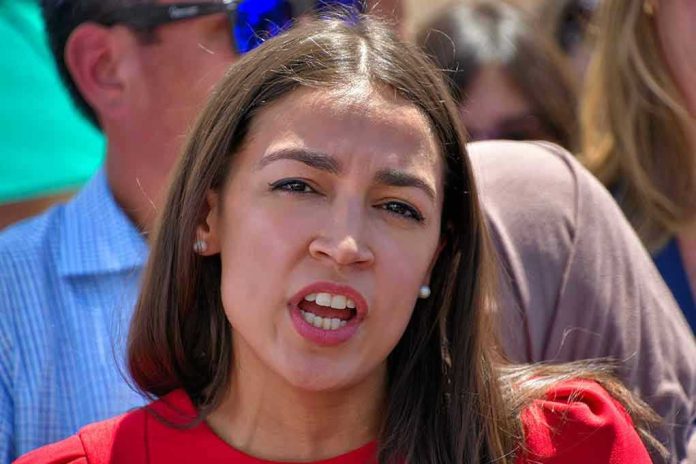
Progressive leaders erupted on live television, exposing deepening fractures in the Democratic Party as rumors swirl about a 2028 Senate showdown.
Story Snapshot
- Sen. Bernie Sanders and Rep. Alexandria Ocasio-Cortez publicly rejected questions about a possible AOC challenge to Sen. Chuck Schumer, showing visible frustration.
- Media speculation on intra-party rivalry distracts from Americans’ real concerns, like rising healthcare costs and economic instability.
- Progressive dissatisfaction with Democratic leadership has intensified, fueling rumors of generational and ideological shifts.
- Ongoing divisions threaten party unity and could reshape national political dynamics ahead of the 2028 election.
Progressive Tensions Erupt on National Stage
During a CNN town hall in October 2025, Sen. Bernie Sanders and Rep. Alexandria Ocasio-Cortez confronted direct questions about whether Ocasio-Cortez might challenge Sen. Chuck Schumer in the 2028 Democratic primary. Both leaders displayed immediate irritation and rejected the premise, labeling such speculation as a distraction from the urgent policy crises facing American families, a frustration echoed by many conservative observers who see media focus on political drama as undermining serious debate about issues like inflation and constitutional rights.
The televised confrontation highlighted widening divisions between progressive Democrats and the party’s establishment. Sanders, an independent aligned with the progressive wing, criticized the press for prioritizing political rivalry over substantive discussion, while Ocasio-Cortez maintained ambiguity about her future ambitions. Their visible anger on air reflected growing dissatisfaction among progressives with policies they view as ineffective, including Democratic leadership’s handling of healthcare, income inequality, and fiscal responsibility.
Background: Power Struggles and Policy Disputes
Chuck Schumer has long represented establishment interests as the leader of the Senate Democratic caucus. His recent votes, such as siding with Republicans on government funding, have intensified frustration among progressives, who accuse party leaders of failing to address critical issues. Alexandria Ocasio-Cortez, a symbol of the party’s leftward shift since her insurgent victory in 2018, and Bernie Sanders, known for his critiques of centrist leadership, have repeatedly clashed with mainstream Democrats over priorities that many conservatives believe threaten traditional values and fiscal stability.
Persistent rumors of an AOC challenge to Schumer have circulated for months, fueled by progressive dissatisfaction and media coverage focused on generational changes. The CNN town hall, set against a backdrop of heightened intra-party debate, amplified public attention on these divisions. For many conservative Americans, such infighting signals a lack of unity and an inability to prioritize real solutions to pressing challenges, from border security to economic growth.
Media’s Role: Distracting from Real Policy Issues
Sanders and Ocasio-Cortez’s refusal to engage in speculation about a primary challenge underscores the impact of media coverage in shaping political narratives. By focusing on intra-party rivalry, major outlets like CNN divert attention from substantive debate on issues that matter to everyday Americans—such as inflation, government overreach, and the erosion of constitutional protections. Sanders explicitly criticized the media for this approach, calling for renewed focus on crises that affect millions, including rising healthcare costs and economic uncertainty, concerns that resonate deeply with conservative voters.
Despite no formal announcement of a primary challenge, ongoing speculation continues to drive headlines. This approach raises concerns among conservatives about the media’s influence on public perception and the risk of further polarizing the electorate. When political coverage centers on personalities and rivalry instead of policy substance, it undermines informed debate and fuels frustration among those who prioritize individual liberty, limited government, and family values.
Implications: Party Unity and Future Political Dynamics
The visible eruption by Sanders and Ocasio-Cortez has short-term consequences, increasing public scrutiny of Democratic divisions and distracting from policy debates that should be front and center. In the long term, the possibility of a significant progressive challenge in the 2028 primary could reshape party leadership, platforms, and national discourse. This dynamic has broader implications, affecting not only Democratic activists and leaders but also voters seeking meaningful policy change. For conservatives, these divisions highlight the dangers of leftist agendas that prioritize ideology over practical solutions and constitutional principles.
Expert commentary notes that insurgent challenges within parties have historically signaled broader ideological shifts. Some analysts caution that media speculation may exaggerate the likelihood of an AOC challenge, while others view her rise as indicative of a generational change in Democratic politics. Regardless, the ongoing debate underscores the importance of vigilance against narratives and policies that erode American values and distract from the real issues facing families across the nation.
Sources:
Sanders and AOC erupt when asked about possible Schumer primary challenge
AOC, Bernie Sanders erupt after being asked if Schumer …
Bernie Sanders and Alexandria Ocasio-Cortez react to Schumer primary challenge question




